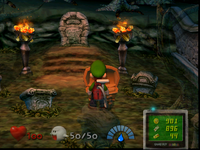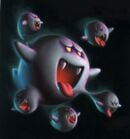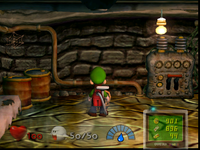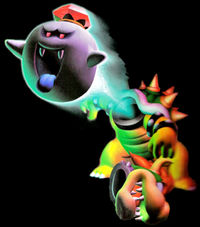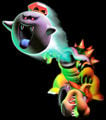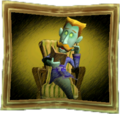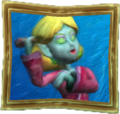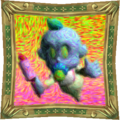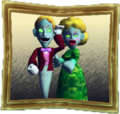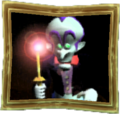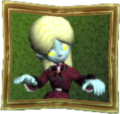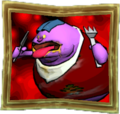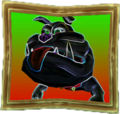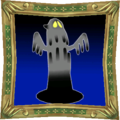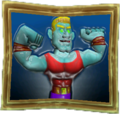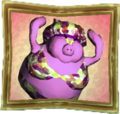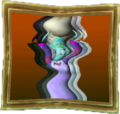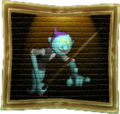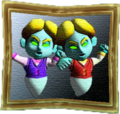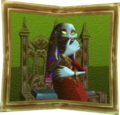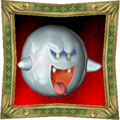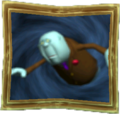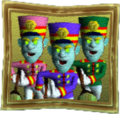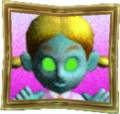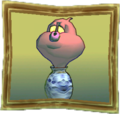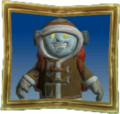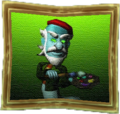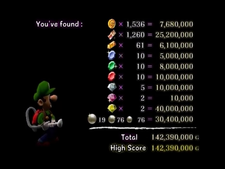Luigi's Mansion
Template:Articleabout Template:Infobox Luigi's Mansion was a launch title for the Nintendo GameCube, released in September 2001. It marks the second time where Luigi is the main character, with Mario playing a supporting role, the first being Mario Is Missing!. Professor E. Gadd and King Boo are also introduced in this game. A sequel to this game was released in 2013.
Storyline
Area 1
Luigi, having won a mansion in a contest he didn't even enter, enters the Boo Woods and locates it. He enters the mansion and is soon attacked by ghosts, but Professor E. Gadd appears and fights off the ghosts with a vacuum. He tells Luigi that the mansion appeared out of thin air and is an illusion, and that Mario was captured by King Boo and his minions. He gives Luigi the Poltergust 3000, to vacuum up ghosts, and the Game Boy Horror to communicate with E. Gadd, scan objects, and see a map of the mansion.
Luigi enters the mansion, sucking up ghosts and finding keys, while meeting Toad along the way, until he encounters a portrait ghost, Neville. He defeats him, sucking him into the Poltergust 3000. He does the same to Lydia, Neville's wife, and fights their baby, Chauncey, who sucks Luigi into his crib and fights him as a giant ghost, but is defeated and sucked into the Poltergust 3000, which begins to get full, so Luigi returns to E. Gadd's lab and empties the Poltergust 3000, turning Neville, Lydia, and Chauncey back into portraits.
Area 2
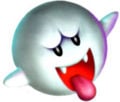
Luigi enters another area through a previously blocked door and fights more ghosts. After defeating the Floating Whirlindas, he enters the Storage Room and hits a switch, which opens a trapdoor where 50 Boos and their leader, King Boo, are hiding. All of them escape, flying into different rooms of the mansion. Luigi returns to E. Gadd's lab and E. Gadd tells him that the Boos were the ones who released the portrait ghosts, and Luigi must capture the Boos to weaken their power, as they are stronger in greater numbers. So Luigi goes through the many rooms of the mansion, vacuuming up any Boos he sees. He also meets Madame Clairvoya, a fortune teller ghost, who tells him to bring her any of Mario's items he finds lying around in the mansion so she can get details on his whereabouts. The items are: Mario's hat, Mario's glove, Mario's shoe, Mario's letter and Mario's star. After sucking up Shivers the butler, Melody Pianissima, Mr. Luggs, and Spooky the dog, Luigi enters the Cemetery and fights the shadowy ghost, Bogmire. He defeats him and sucks him into the Poltergust, which he then empties at E. Gadd's lab to turn all the Portrait Ghosts into portraits.
Area 3
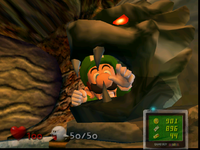
Luigi enters a third area into the courtyard. Down the well, he sees into King Boo's altar, and discovers that King Boo has imprisoned Mario in a portrait. He goes through new rooms of the mansion, finding Mario's items and vacuuming up ghosts, including portrait ghosts Biff Atlas, Miss Petunia, Nana, Slim Bankshot, and twins Henry and Orville. After Luigi brings Madame Clairvoya enough of Mario's items, she tells him that she sees Bowser in a vision, which is shocking because Mario defeated Bowser, and she suspects that King Boo revived him. With her job done, she tells Luigi to suck her into the Poltergust so she can return peacefully to her portrait. After he does so, and defeats enough Boos, he enters the balcony and fights Boolossus, a big Boo made up of 15 Boos. He throws him into a spiky statue to split him into the 15 Boos and sucks them all into the Poltergust. He then empties the Poltergust at E. Gadd's lab to turn all the portrait ghosts, including Boolossus, into portraits.
Area 4
When Luigi enters Area 4 in the attic, the mansion is suddenly struck by lightning and it goes dark. He then goes to the breaker room to turn the power back on, but finds it locked. Luigi looks for the key and soon encounters a ghost named Uncle Grimmly and defeats him to get the key. After he turns the power back on, he catches more Boos and portrait ghosts, including the Clockwork Soldiers, Sue Pea, Jarvis, and Sir Weston, before entering the room of Vincent Van Gore, one of the most prominent portrait ghosts who is painting regular ghosts. He sends several waves of ghosts after Luigi, but Luigi defeats them all, causing Van Gore to go into a state of depression, and Luigi sucks him into the Poltergust without much resistance. He then goes to the Secret Altar down a creepy hallway in the basement and encounters King Boo, who reveals that he was the one who told Luigi that he won the mansion in a contest, and set it up as revenge for all the trouble they caused him (though they may not have met him before, they have been fighting against Boos for years, plus King Boo works for Bowser). King Boo goes into Mario's portrait (which turns into a Bowser portrait) and sucks Luigi into it. In an arena resembling the roof of the mansion with fire for a background, Luigi fights Bowser (as Madame Clairvoya had seen), but when he hits him in the head with a bomb, it is revealed to be King Boo inside a False Bowser. Luigi defeats King Boo while avoiding Bowser's head and sucks him into the Poltergust.
Luigi returns to the lab and turns all the portrait ghosts, including King Boo, into portraits again. E. Gadd then reverses the Portrificationizer to release Mario from his portrait. After Mario goes through a reverse-procedure of all the portrait-ghosts captured, he rockets out of the machine, colliding with Luigi, but being otherwise alright. Luigi laughs and cries with happiness that his brother is safe. Since King Boo has been defeated his illusion of a mansion fades away, though the money and jewels Luigi collected in the mansion was real, and with it he gets a new mansion or house. But if Luigi gets H rank, he ends up with only a tent.
Controls
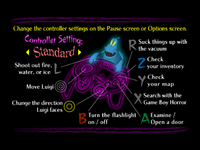
The Poltergust 3000 is controlled by pressing and holding the ![]() button. When the ghost(s) are being sucked, the player must tug the control stick in the opposite direction of the nozzle to take away HP. The player can move only the Poltergust 3000, but not Luigi, with the C stick.
button. When the ghost(s) are being sucked, the player must tug the control stick in the opposite direction of the nozzle to take away HP. The player can move only the Poltergust 3000, but not Luigi, with the C stick.
The ![]() button makes Luigi examine objects or call out for Mario (how he calls out the name differs on how much HP Luigi has remaining). The
button makes Luigi examine objects or call out for Mario (how he calls out the name differs on how much HP Luigi has remaining). The ![]() button controls Luigi's flashlight in dark areas. Ghosts freeze for a short time when Luigi points the flashlight at them. The trick to capturing ghosts is holding the
button controls Luigi's flashlight in dark areas. Ghosts freeze for a short time when Luigi points the flashlight at them. The trick to capturing ghosts is holding the ![]() button to turn off the flashlight, allowing the ghosts to come close, and then releasing
button to turn off the flashlight, allowing the ghosts to come close, and then releasing ![]() . The ghosts stop in front of the Poltergust 3000, where Luigi can now suck them up with
. The ghosts stop in front of the Poltergust 3000, where Luigi can now suck them up with ![]() . Finally, the
. Finally, the ![]() button emits an element once an Elemental Medal is collected. The
button emits an element once an Elemental Medal is collected. The ![]() ,
, ![]() , and
, and ![]() buttons bring up the Game Boy Horror's different modes.
buttons bring up the Game Boy Horror's different modes.
There is also the option to switch the controls of ![]() to either "standard" or "sidestep" mode. In standard mode, Luigi turns to face a direction before walking in that direction. In sidestep mode, Luigi does not turn to face a direction before walking that way. In both modes, the
to either "standard" or "sidestep" mode. In standard mode, Luigi turns to face a direction before walking in that direction. In sidestep mode, Luigi does not turn to face a direction before walking that way. In both modes, the ![]() is then used to change the direction he is facing manually. Luigi always uses sidestep mode controls while vacuuming. Some ghosts are actually easier to catch while in sidestep mode.
is then used to change the direction he is facing manually. Luigi always uses sidestep mode controls while vacuuming. Some ghosts are actually easier to catch while in sidestep mode.
Characters
- Professor Elvin Gadd.JPG
The Ghosts
Common Ghosts
- Bat
- Blue Blaze
- Blue Mouse
- Blue Twirler
- Bowling Ghost
- Ceiling Surprise
- Flash
- Flying Fish
- Garbage Can Ghost
- Grabbing Ghost
- Gold Ghost
- Gold Mouse
- Purple Bomber
- Purple Puncher
- Purple Mouse
- Shy Guy Ghost
- Skeleton Ghost
- Spark
- Speedy Spirit
- Temper Terror
- Waiter
Portrait Ghosts
In his exploits, Luigi captures up to twenty-three gallery ghosts (five are optional). These ghosts (excluding the third and the final/fourth boss) have 100 HP, but their hearts are not automatically shown like other ghosts: Luigi must find each ghost's weakness before he can suck them up. The following are listed in order of appearance appear in the game:
Area One
Neville
The Bookish Father
(Required)Lydia
The Mirror-Gazing Mother
(Required)Chauncey
The Spoiled Baby
(Area Boss)
Area Two
The Floating Whirlindas
The Dancing Couple
(Required)Shivers
The Wandering Butler
(Required)Melody Pianissima
The Beautiful Pianist
(Required)Mr. Luggs
The Glutton
(Optional)Spooky
The Hungry Guard Dog
(Required)Bogmire
The Cemetery Shadow
(Area Boss)
Note: Although Luigi first meets Madame Clairvoya in Area Two, he captures her after he begins Area Three.
Area Three
Biff Atlas
The Bodybuilder
(Optional)Miss Petunia
The Bathing Beauty
(Required)Nana
The Scarf Knitting Granny
(Required)Slim Bankshot
The Lonely Pool Shark
(Optional)Henry and Orville
The Twin Brothers
(Required)Madame Clairvoya
The Freaky Fortune Teller
(Required)Boolossus
The Jumbo Ghost
(Area Boss)
Area Four
Uncle Grimmly
Hermit of the Darkness
(Required)Clockwork Soldiers
The Toy Platoon
(Required)Sue Pea
The Dozing Girl
(Optional)Jarvis
The Jar Collector
(Optional)Sir Weston
The Chilly Climber
(Required)Vincent Van Gore
The Starving Artist
(Required)
The Boos
- Main article: List of Boos in Luigi's Mansion
There are fifty one (including King Boo) Boos that hide in the various rooms of the mansion. Thirty-five of these are named to differentiate between them, and the remaining fifteen make up the third Boss of the game, Boolossus. The magic of the King Boo's spells increase based on the number of his minions nearby. Because of this, Luigi needed to capture twenty Boos to break the seal designed to block Boolossus from him. After capturing twenty more, the seal separating Luigi from King Boo was broken. If Luigi catches all fifty Boos, he will be rewarded with the extremely valuable Gold Diamond. Each of the Boos' names are puns. For example, "Booigi" is a pun on "Luigi" and "Game Boo" is a nod to the Game Boy.
Other Ghosts
The Money
| Image | Name | Score | Maximum Count | Image | Name | Score | Maximum Count | Image | Name | Score | Maximum Count | ||
|---|---|---|---|---|---|---|---|---|---|---|---|---|---|
| File:GoldCoin.png | Gold Coin | 5,000 G | 1536 | Bill | 20,000 G | 1260 | Gold Bar | 100,000 G | 61 | ||||
| File:BlueJewel.png | Blue Sapphires | 500,000 G | 10 | Green Emeralds | 800,000 G | 10 | Red Rubies | 1,000,000 G | 10 | ||||
| File:SilverDiamond.png | Silver Diamond | 2,000,000 G | 5 | File:RedDiamond.png | Red Diamond | 5,000 G | 2 | Gold Diamond | 20,000,000 G | 2 | |||
| Small Pearl | 50,000 G | 76 | Medium Pearl | 100,000 G | 76 | Big Pearl | 1,000,000 G | 19 |
Professor E. Gadd's Gallery
Professor E. Gadd had trapped the Portrait Ghosts into paintings during his past ghost adventures and put them for display in his personal gallery - until King Boo released each of them. As Luigi recaptures gallery ghosts, they will be framed in three colors: bronze, silver, or gold. The color depends on how much HP (out of 100 for each non-boss gallery ghost) Luigi sucks in one go, which produce pearls:
- Bronze. Only small pearls, which Luigi earns one for every 10 HP sucked at once. This frame is also the only frame that Luigi can get if he has less than 50 HP while capturing the portrait ghost. The portrait ghost itself is poor in quality.
- Silver. At least one medium pearl, which the ghost gives up for every 50 HP sucked and every 10 after. So for 60, 70, and 80 HP at once, Luigi earns another medium pearl. If Luigi has 50-89 HP, this is the best quality portrait that he can get while capturing the portrait ghost. The portrait ghost is shown in better quality.
- Gold. The only big pearl possible is given up if Luigi can suck 90 HP in one turn. Luigi also needs to have 90 HP or better to get this frame. The quality of the portrait ghost is most often just what it looked like when Luigi captured it.
If Luigi sucks all 100 HP at once, no extra pearl is awarded. The maximum amount of money to be gained per Portrait Ghost is 1,600,000G: 4 small pearls, 4 medium pearls, and 1 big pearl.
Boss gallery ghosts' (Chauncey, Bogmire, Boolossus, and King Boo) frames and quality are determined by how high Luigi's health is after capturing the ghost.
- Bronze. If Luigi fails to keep his health at 60 HP, he will get this painting.
- Silver. To get this portrait, Luigi's health must be kept above 60 HP at the end of the battle.
- Gold. To obtain this high-quality painting, he must enter the fight at full health (100 HP), and at the end of the battle, his health must not have declined below 90 HP.
Luigi's New Mansion
Similar to the mechanics of Wario Land: Super Mario Land 3, all of the money and treasure Luigi collects in his adventure is used to build a new mansion in place of the old one. The more money he collects from treasure rooms, watering plants, catching Portrait Ghosts and examining furniture, the better the mansion will be (it will be a large / small house in the lower ranks). The house will become a painting at the front of the Gallery, with Luigi's total money on the bottom-left corner. The message will be "Welcome to Luigi's NEW Mansion!" unless Luigi achieved Rank A or H. The requirement to achieve Rank A was increased significantly during localization for PAL regions, hence the two values given for Rank A and Rank B.
- Rank A: Finish the game with over 100,000,000G or 150,000,000G(PAL). + Message: Congratulations! Your mansion is complete!
- Rank B: Finish the game with 70,000,001 to 100,000,000G or 70,000,001 to 150,000,000G.
- Rank C: Finish the game with 60,000,001 to 70,000,000G.
- Rank D: Finish the game with 50,000,001 to 60,000,000G.
- Rank E: Finish the game with 40,000,001 to 50,000,000G.
- Rank F: Finish the game with 20,000,001 to 40,000,000G.
- Rank G: Finish the game with 5,000,001 to 20,000,000G.
- Rank H: Finish the game with 5,000 to 5,000,000G. + Message: The haunted mansion disappeared without a trace...
Oddly enough, it may be considered more difficult to achieve Rank H than Rank A, as Luigi will usually collect more than 5,000,000G without actively trying to get money. Thus, the player must work to avoid money if they want to achieve rank H.
The Rank A Mansion appears at the side of Luigi Circuit in Mario Kart: Double Dash!!. However, Rank D is shown in the opening of the sequel, Luigi's Mansion: Dark Moon.
Hidden Mansion
Once the player beats the game once, the quest retried in the normal mansion or the "Hidden Mansion". It is the same gameplay, except for two things: a) Ghosts (including Boos) give double the damage to Luigi, b) The Poltergust 3000 has 1.5 times more power. This can help get more pearls, which means more money and nicer frames.
PAL Differences
The PAL version of Luigi's Mansion (Europe and Australia) increased the number of changes for the Hidden Mansion:
- The PAL Hidden Mansion is mirrored from left to right when compared to the Normal Mansion. The NTSC version keeps the layout the same.
- There are more normal ghosts around the mansion.
- Bosses are more difficult, having different attacks. (Chauncey's rocking horses, for example, are much bigger, and swerve left to right instead of going straight). A major change in the Boolossus battle is that the player rides around on the vacuum cleaner while trying to pop Boolossus, making movement more slippery.
- Rooms are much darker in the PAL version; this, however, is only as dark as in the NTSC version of both mansions, the normal PAL mansion being lighter.
- Most Boos have more HP in the PAL version, although some have less.
- Fewer hearts. Locations that have hearts in the Normal Mansion do not have them. Hearts that heal 50 HP exist in the Courtyard by vacuuming the Slim Banskshot-like statue.
- Speedy Spirits and Gold Mice always give up a Silver Diamond when caught, raising the maximum possible amount of money from 142,390,000G to 186,440,000G[1]. Since the requirement to achieve a Rank A mansion in PAL regions is higher than the amount of money in the normal mansion, it is necessary to play through the hidden mansion to receive Rank A in those regions.
- 45 rather than 40 Boos are required to fight the final boss.
- Boos are, in general, more agile and difficult to catch.
- Five ghosts rather than three fight Luigi in The Artist's Studio.
These changes were made after American and Japanese gamers complained that the Hidden Mansion offered virtually no changes. Shigeru Miyamoto himself thought up some things to add to the PAL version's Hidden MansionTemplate:Refneeded. Most of the changes made seem to make the PAL version harder than the NTSC version.
Gallery
A Boo
- Gold Ghost.jpg
- Professor Elvin Gadd.JPG
Professor E. Gadd with the Poltergust 3000.
Some of the different kinds of Ghosts found in the game (in the center, Biff Atlas)
Media
Quotes
- Main article: List of quotes in Luigi's Mansion
Luigi
- "MARIO!/MARIOOO?/Mario?/M-M-M-M-Mario?"
- "What a dreadful picture... But that candle next to it might be important..."
- "I'm willing to bet there's something cold in here."
Professor E. Gadd
- "I'm getting too old for this ghost-catching tomfoolery."
- "I swear, this house seems to have more and more ghosts every day!"
- "Alright, youngster! Look lively! Follow me, posthaste!"
Beta elements
- Main article: List of Luigi's Mansion beta elements
The game was originally going to be on a 24 hour time limit, if the game wasn't completed in the time then the mansion would disappear. The Foyer was originally called the "Entrance". The Poltergust 3000 had a heat meter, and if it got too hot it would explode and damage Luigi.
Staff
- Main article: List of Luigi's Mansion staff
The game's producers were Shigeru Miyamoto and Takashi Tezuka, and the director of the game was Hideki Konno.
References to Other Games
- Mario Bros. and Super Mario World: Both games were mentioned during Melody's quiz.
- Super Mario Bros.: One of the songs that Melody plays on her piano is a remix of the underwater stage theme. Also, the Luigi sprite shown on the Game Boy Horror is a sprite from the Super Mario All-Stars version of the game. The game's aboveground stage theme is played if Luigi checks all instruments in the Conservatory, and the underground theme is played during a part of the credits. The Bowser mech manned by King Boo may also be loosely based on the False Bowsers from this game in castles 1 through 7.
- Super Mario Bros. 3: One of the other songs played on Melody's piano is a remix of the grass stage theme. Boos return from this game, but they were called "ghosts" by Princess Toadstool.
- Wario Land: Super Mario Land 3: Luigi's new mansion at the end of the game depends on the score the player has, similar to how Wario's castle will end up better with a higher score.
- Super Mario 64: When talking to Toad, a remix of the theme heard when talking to Toads in Super Mario 64 is played. Several other sound effects were taken from this game as well. Also, Madame Clairvoya says that Bowser had recently been defeated by Mario.
- Paper Mario: Although this reference was lost during translation, one of Neville's books (in the Japanese version) is titled "Mario Story" which is both Paper Mario's Japanese title and the title of the book Herringway wrote about the game's story (also in the Japanese version).
References in Later Games
- Super Smash Bros. Melee: There was a Luigi's Mansion trophy, where Luigi was using the Poltergust 3000.
- Super Mario Sunshine: A Boo-based boss in this game is named King Boo in the English version, though the character is otherwise unrelated to the antagonist from Luigi's Mansion. Also, E. Gadd is said to have invented F.L.U.D.D. and Bowser Jr.'s magic brush, and is mentioned by Bowser Jr. as "a strange old man in a white coat". A Pianta cleaning the floor in the roof of Hotel Delfino in the episode 'Mysterious Hotel Delfino' at Sirena Beach wishes that someone would suck up the ghosts in the hotel with a vacuum, as a reference to the Poltergust 3000.
- Mario Kart: Double Dash!!: Luigi's Mansion appears as an unlockable battle course in this game. King Boo also appears as an unlockable playable character. Several of the Portrait Ghosts appear in the main area, including King Boo's gold frame.Luigi's Rank A Mansion appears in the background of Luigi Circuit
- Mario & Luigi: Superstar Saga: Professor E. Gadd makes a cameo appearance, and Luigi occasionally takes out the Poltergust 3000. A few of the ghosts appear in the Starbeans Café and are vacuumed by E. Gadd, while the Luigi's Mansion theme plays.
- Paper Mario: The Thousand-Year Door: When Luigi appears in the audience, he would occasionally have the Poltergust 3000 on his back. It does not affect anything in-game, though.
- Mario Power Tennis: Luigi's Mansion is also a playable tennis court that has the ghosts rising from their graves trying to distract the players.Also Luigi uses his Poltergust 3000 for his defense shot.
- Super Mario 64 DS: King Boo appeared as a boss in this game, ironically capturing Luigi after vowing to catch him in Luigi's Mansion. After he was defeated by Mario, Luigi can be unlocked. There was also a minigame in the Rec Room that was based off of Luigi's Mansion called Hide and Boo Seek, where Luigi had to find a certain amount of Boos in the darkness by scribbling out the black to reveal them.
- Super Princess Peach: King Boo appears again as a boss, and is destroyed again upon being defeated by Peach.
- Mario Kart DS: Luigi's Mansion is a race course in this game. Plus, the Poltergust 4000 (based on the Poltergust 3000) was Luigi's first character-specific kart.
- Mario & Luigi: Partners in Time: Professor E. Gadd appears again, and has a more major role than in the previous Mario & Luigi game. In addition, when the Mario Bros. travel into the past, they meet the younger E. Gadd whose lab is destroyed by a volcanic eruption, and he says he will set up a new lab in Boo Woods, foreshadowing Luigi's Mansion. Also, in most scenes with Professor E. Gadd, a remix of the Luigi's Mansion theme can be heard.
- Mario Hoops 3-on-3: Luigi's Mansion appears as a basketball court, where the ghosts from Luigi's Mansion fly around trying to grab the basketball.
- Super Paper Mario: The main foyer of the mansion appears to be the location of the Mansion Patrol arcade game.
- Mario Party 8: The ghosts from Luigi's Mansion re-appear in the minigame (which may be somewhat based on Luigi's Mansion) Specter Inspector.
- Super Mario Galaxy: Luigi appears in the Ghostly Galaxy after being kidnapped by the ghost Bouldergeist, and Mario must save his brother. This is the exact opposite of what happens in Luigi's Mansion.
- Super Smash Bros. Brawl: Luigi's Mansion appears as an unlockable stage and trophy in this game, and the Luigi's Mansion main theme is one of the selectable music themes for this stage. Also, in the "King Dedede steals Peach" and "King Dedede steals Zelda" cutscenes of the Subspace Emissary (where Luigi is introduced), a different remix of the Luigi's Mansion theme plays as well[2].
- Mario Kart Wii: King Boo appears as an unlockable playable character.
- Mario Super Sluggers: Luigi's Mansion is a playable baseball park.
- Mario Sports Mix: Luigi's Mansion makes an appearance as a basketball court and a volleyball court.
- Mario Kart 7: Luigi's Mansion returns as a Retro Stage.
- Mario Party 9: King Boo reappears as a boss in the minigame King Boo's Puzzle Attack. In Boo's Horror Castle, there are painting references of Garbage Can Ghosts and Vincent Van Gore. Some of the rooms of the mansion are also referenced.
- Luigi's Mansion: Dark Moon: The sequel to Luigi's Mansion that uses many elements from the game, including Mario being trapped in a painting by King Boo.
- Mario & Luigi: Dream Team: One of the messages floating in Luigi's Dream's Deep says "I fight ghosts!", a reference to this game.
Reception
The game has received mostly positive reviews. Gamespot gave the game a 7.9/10, [3] IGN gave it a 7/10 [4] and Nintendo Life gave it an 8/10 [5]. The game was mainly praised for its clever features and for giving Luigi a starring role. However, it was criticized for its short length.
Names in Other Languages
Trivia
- A mistake on page 30 of the U.S. edition of the Luigi's Mansion instruction booklet shows Professor E. Gadd speaking in Japanese.[6]
- Totaka's theme can be heard by going to the Training Room and waiting at the tutorial screen (the one where Luigi learns how to use the Poltergust 3000) for 3 minutes and 15 seconds.
- When Luigi sees ghosts in the mirror, they are solid, while in-game, they are transparent.
- There are many references to past Nintendo consoles and handhelds (i.e. GameBoo, Game Boy Horror).
- This game marks the first time Mario and Luigi receive a revamped appearance from the N64 era to their current appearances onward.
